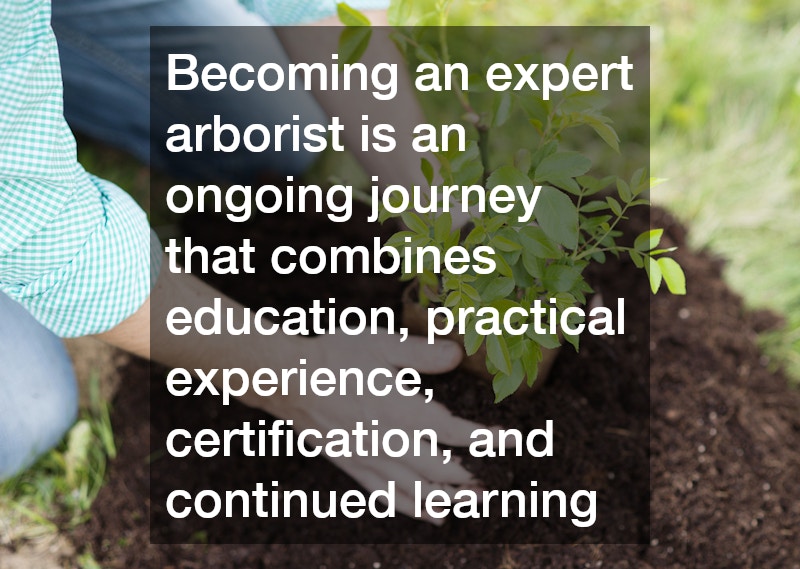Understanding the intricate roles of trees in our ecosystem is not only fascinating but pivotal for maintaining the planet’s health. Trees provide critical services such as air purification, climate regulation, carbon sequestration, and wildlife habitats, making their care and preservation essential in the face of environmental challenges. Becoming an expert arborist allows you to gain profound knowledge about tree biology, care, and management while contributing to the environment in a tangible way. This profession combines science, a love for nature, and technical skills, offering a rewarding and meaningful career path that directly impacts communities and natural spaces alike.
Arborists serve as guardians of green spaces, ensuring that trees thrive in both urban and rural settings. But where does one begin this green journey, and how does one reach the expert level in arboriculture? In this comprehensive guide, we’ll explore the essential steps to cultivate your skills and knowledge to become an expert arborist, from foundational education to lifelong learning and hands-on experience.
Step 1: Gain an Educational Foundation
The first step towards becoming an expert arborist is acquiring foundational knowledge in fields such as botany, forestry, or environmental science. Many aspiring arborists start with a degree or certification program that covers the basics of tree biology, soil science, and ecology. These courses provide crucial insights into the life cycles of trees and their interaction with the environment. Additionally, learning about plant pathology is essential for diagnosing and treating tree diseases. A solid educational foundation will equip you with the theoretical knowledge necessary to make informed decisions in the field.
Step 2: Develop Practical Skills Through Experience
While theoretical knowledge is essential, hands-on experience is irreplaceable for an aspiring arborist. Engaging in internships or entry-level positions in tree care companies will help you apply what you’ve learned in real-world scenarios. You’ll gain experience in pruning, planting, and maintaining trees, which are critical skills in arboriculture. Moreover, confronting challenges like pest infestations or storm damage will enhance your problem-solving abilities. Practical experience not only deepens your understanding but also builds the confidence needed to tackle complex situations as you advance.
Step 3: Obtain Certification
Being certified is a significant milestone in becoming an expert arborist. Certification, such as from the International Society of Arboriculture (ISA), not only validates your expertise but also increases your credibility among clients and peers. The ISA Certified Arborist credential requires a combination of education and work experience, followed by passing a comprehensive exam. This certification ensures that you are updated with the latest practices and adheres to industry standards. Pursuing specialized certifications, like tree risk assessment or utility specialist, can further distinguish you in the field.
Step 4: Cultivate a Passion for Learning
Arboriculture is a dynamic field, with advances in technology, techniques, and environmental studies constantly shaping how professionals approach their work. Cultivating a lifelong passion for learning is crucial for staying current with industry developments. Attending workshops, seminars, and conferences will expose you to new ideas and methodologies. Networking with other industry professionals can also provide fresh perspectives and collaborative opportunities. Continuous learning ensures that you remain a leader in the field, capable of offering innovative solutions to complex arboricultural challenges.
Step 5: Specialize to Distinguish Yourself
To become an expert arborist, consider specializing in a niche area of arboriculture. This might include urban forestry, pest management, or consulting, each requiring a unique set of skills and knowledge. Specialization can enhance your reputation as a leader in that sector, making your services sought-after. The fact is, specialized arborists can command higher rates and attract more distinguished clients who require specific expertise. Whether you choose to focus on consultancy or tree health care, specialization will elevate your professional profile within the industry.
Becoming an expert arborist is an ongoing journey that combines education, practical experience, certification, and continued learning. The path requires a blend of passion, dedication, and a willingness to adapt to new challenges. By following these steps, you not only enhance your skills and credibility but also contribute positively to environmental stewardship. Whether it’s managing urban landscapes or preserving natural forests, expert arborists play a crucial role in maintaining the green tapestry of our planet. Their work supports biodiversity, improves public health, and ensures sustainable growth in both cities and rural areas. As climate change and urban development continue to impact our ecosystems, the expertise of skilled arborists becomes more vital than ever. With commitment and perseverance, you can find fulfilling career success in arboriculture—knowing your efforts make a meaningful difference in shaping a healthier, greener future for generations to come.
.




